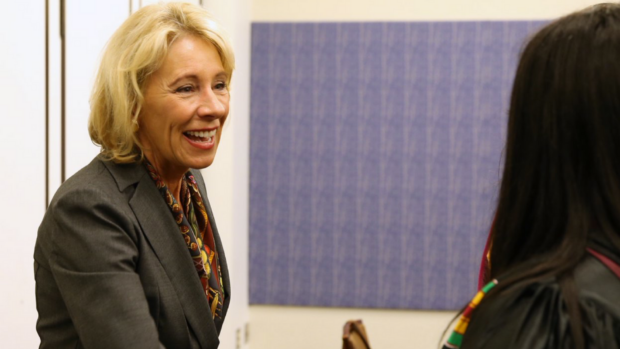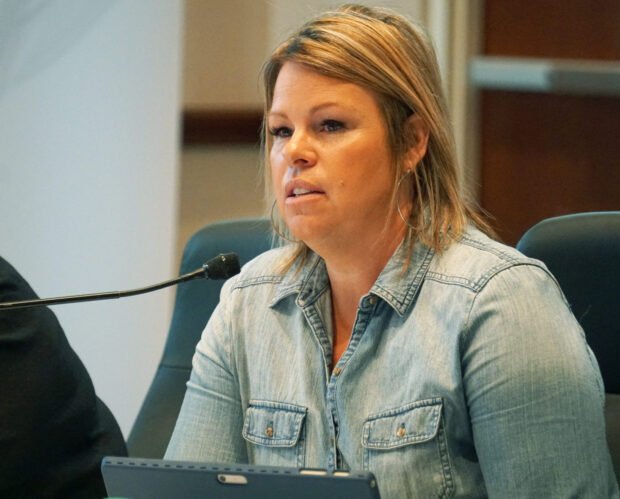State education officials are moving ahead with plans to administer standardized tests to public school students this year following guidance from U.S. Secretary of Education Betsy DeVos.

Last week, DeVos sent a letter to state education chiefs, including Superintendent of Public instruction Sherri Ybarra, telling them she does not anticipate issuing a waiver relieving states of testing requirements during the 2020-21 school year.
Last year, due to the coronavirus pandemic, the feds approved testing waivers for all 50 states, Washington D.C. and Puerto Rico.
But after a one-year reprieve, testing is back on.
In the Sept. 3 letter, DeVos told state education chiefs that testing provides data that shows how children are performing at school. DeVos said she is concerned spring school closures widened achievement gaps among low-income students, minorities and students with disabilities.
DeVos said it’s important to gather data on where students are to guide decision-making and meet students’ needs.
“As a result you should not anticipate such waivers being granted again,” DeVos wrote in her letter, underlining part of the text to emphasize her point.
State Board of Education President Debbie Critchfield said the state’s non-binding reopening guidance already encouraged schools to begin assessing students when they returned at the beginning of this year.
Critchfield shares DeVos’ concerns about achievement gaps. She said it is important to approach the tests as an informational tool for measuring gains or losses during unprecedented disruption to the education system. Tests should not be approached as a tool to punish or shame schools, she said.

“As students come back, it is important to take the time to understand where they are,” Critchfield said. The State Board has not yet met to discuss DeVos’ letter and Critchfield said she was sharing her personal perspective, not speaking for the board.
Ybarra had a similar perspective. The State Department of Education issued a written statement saying officials were already preparing to give tests this school year.
“The SDE has been working through the summer with our assessment vendors to prepare for a variety of scenarios in our schools so we can provide them with options and flexibility in administering assessments to meet districts’ unique needs,” the statement said.
U.S. Rep. Russ Fulcher, R-Idaho, said Congress has helped states prepare for these challenges by providing emergency relief funds for schools that schools have tapped into.
“Emergency federal monies were given to states through the CARES Act, in part to assist teachers as they navigate safely instructing our children during this pandemic,” Fulcher said in a written statement Thursday. “While it’s impossible for us to predict the progress of these new pandemic-era education procedures, possible vaccines, and the state of our country during the testing season of Spring 2021, I support pursuing creative options to educate our children and I share Secretary DeVos’ optimism for the future.”
Testing takes place in some form or fashion throughout the school year, but DeVos was specifically referring to federal assessment requirements. In Idaho, that means the Idaho Standards Achievement Test (ISAT) test, which is given in grades 3-8 and once in high school. The SDE’s testing calendar shows the ISAT testing window is scheduled to run March 15-May 14.
Idaho already has some experience administering assessments to students during the pandemic. Last year, the state did not waive Idaho Reading Indicator requirements, and that test was given to K-3 students in the spring amid widespread school closures.
Although that test didn’t apply to nearly as many students, Critchfield said state leaders will use experience from the spring IRI testing experience to help administer the required tests this year.
“When the time comes to take the test, I know students and teachers and everyone else will feel pretty nervous walking into a test that got waived last year,” Critchfield said. “I think we then have an obligation to help support teachers and students so districts feel like they have what they need to support what’s happening in classroom.”
Critchfield said she views DeVos’ statement as an early heads up about plans for the school year. That gives the states time to prepare for administering the test amid the uncertainty of school re-openings and closings.
DeVos said she wrote the letter after several state education chiefs recently asked about the possibility of issuing waiver again this school year.
Idaho Education News requested reaction to DeVos’ guidance from Gov. Brad Little and U.S. Rep. Mike Simpson, R-Idaho, on Wednesday afternoon. We will update this story if they respond.
